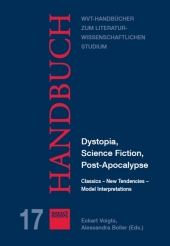 Neuerscheinungen 2015Stand: 2020-02-01 |
Schnellsuche
ISBN/Stichwort/Autor
|
Herderstraße 10
10625 Berlin
Tel.: 030 315 714 16
Fax 030 315 714 14
info@buchspektrum.de |

Alessandra Boller, Eckart Voigts
(Beteiligte)
Dystopia, Science Fiction, Post-Apocalypse
Classics - New Tendencies - Model Interpretations
Herausgegeben von Voigts, Eckart; Boller, Alessandra
2015. 440 S. 225 mm
Verlag/Jahr: WVT WISSENSCHAFTLICHER VERLAG TRIER 2015
ISBN: 3-86821-565-4 (3868215654)
Neue ISBN: 978-3-86821-565-6 (9783868215656)
Preis und Lieferzeit: Bitte klicken
Dystopian and post-apocalyptic narratives, often within the generic framework of science fiction, are currently enjoying a remarkable popularity. Two world wars that brought the nemesis of technology and rationality, large-scale industrialism, collectivism and mass culture these are historical stepping stones towards the rise of the classic dystopian and apocalyptic imagination in the 20th century. Since then, narratives of a future societal collapse have responded to a set of urgent challenges that, if anything, have increased at the beginning of the 21st century, from climate change and other eco-disasters to the economic crises of globalisation, fundamentalist counter-reactions to modernity, the rise of Big Data, the scientific dynamics in biotechnology, wild urbanisation, migration and displacement, and more.
This collection of essays presents an introduction to the field, providing model analyses of key texts, and taking a look at these visions of crisis and collapse not only in prose fiction, but also in films, graphic novels and computer games. Structured according to the main thematic and conceptual clusters (totalitarian, biopolitical, mechanistic, ambiguous, religious, eugenic dystopia etc.), this handbook offers fresh readings of the classics of dystopian literature (Wells, Orwell, Huxley, Forster, Golding, and others). It also focuses on the defining current fictions that resonate with readers and viewers around the globe, from Margaret Atwood s eco-dystopias and the gendered science fiction of Ursula K. Le Guin or Octavia Butler to post-colonial (J. M. Coetzee), post-nuclear and postmodern dystopias (Blade Runner, The Matrix, Cloud Atlas), and from cyberpunk and post-apocalyptic narratives such as Cormac McCarthy s The Road to young adult dystopias such as Suzanne Collins The Hunger Games.


